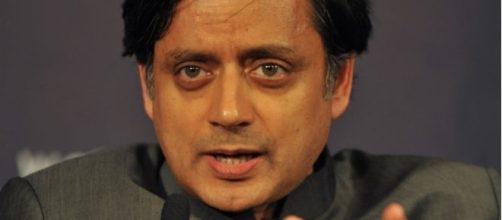Dr Shashi Tharoor is a man of knowledge and wisdom. He certainly qualifies as a top scholar on things that are related to India. In the Indian National Congress (INC), the man doesn’t have much of a parallel. And hence, when one praises the MP from Thiruvananthapuram in Kerala for his latest book ‘An Era of Darkness: The British Empire in India,' it is not without a reason. The insights that the former central minister often brings out in several of his writings speaks volumes about his authority and this is something not many architects of the public discourse in today’s India can challenge him on.
In a way, Shashi Tharoor is an exception in an otherwise dull and mediocre world of Indian politics.
Therefore, when this man writes a book to expose what the British had done to India over two centuries to back his own impassioned speech against the colonization of India at a prestigious debate in Oxford, one strongly feels it not just about a book.
Tharoor rediscovering the past to make an alternative space?
Given Tharoor’s thorough understanding of India and its politico-cultural identity, one would not be mistaken to say that through this book, the former diplomat is trying to revive the old-day nationalism which the INC had once championed. That nationalism has been eclipsed by a new Hindutva-dominated version, but Tharoor wants to help the party regain its lost space.
In an interview with a frontline Indian media house on November, Tharoor emphasized on this very aspect as well. He said unlike the nationalism of those days which was all-inclusive, the brand of nationalism seen in India today is narrow-minded and exclusionary. He objected to the idea that foreign rule had prevailed in India for 1,200 years and not just 200 years of the British rule which means the Hindu nationalists today also see the Muslim rulers before the advent of the Europeans as foreign. According to Tharoor, those rulers might have originated as foreigners but gradually imbibed the Indians. This is precisely what the Nehruvian brand of nationalism says. A brand which emphasizes on territory and not cultural exclusiveness – the ideological foundation of the current ruling lot.
The Congress has struggled in the Modi years
For the INC, the overwhelming majoritarianism of the Bharatiya Janata Party and its supporters has been a tough challenge to beat. Though it has ruled India for most of its post-Independence era, the weakening of the Gandhis – the party’s powerhouse – and the failure of the party to keep pace with the fast-changing India of the liberalized era has left the INC in decay. There is very little space for the party to project an alternative – be in terms of ideology, leadership or record of governance and herein lies the significance of Tharoor's 'Era of Darkness'.
The INC leader has read the situation wisely and is trying to promote the lost brand of nationalism which can strike a chord with the liberal sections of the country that are feeling dissatisfied with the Narendra Modi regime.
The British exploited India, we all know it, isn't it?
There is nothing new to learn from the fact that the former colonial masters had heavily exploited India. But Tharoor’s contribution lies in the fact that he has started a sort of rediscovery of India’s history to make a space which is required for an anti-majoritarian alternative. For the educated and liberal elite, therein lies the cue to find and support a renewed discussion on the traditional variety of nationalism which suits them and puts the right-wing Hindu nationalism under some kind of challenge.
It is no overstatement that only an erudite person like Tharoor could have turned the colonial past into an opportunity for his party which has found itself completely dissociated from its glory. Now the question is: How much backing will the MP get from Rahul Gandhi in this project?

